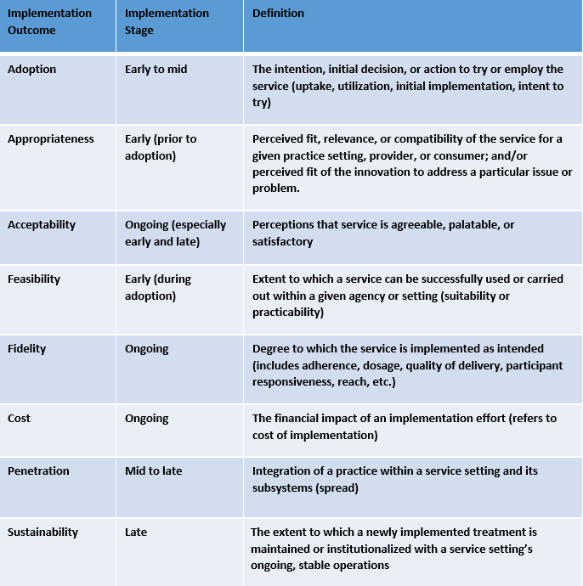“What does implementation science (IS) have to do with PIE?” We’re so glad you asked! Though it has less to do with the delicious culinary creation than one might like, it will be vital to the success of the Slice of PIE initiative. Implementation science is defined as the study and application of strategies that promote the systematic uptake of research findings and other evidence-based practices into routine use[1]. Traditionally, integration of new healthcare service models into routine clinical practice has been reported to take an average of 17 years, with only 14% use[2] With use of active implementation strategies, this timeframe can be reduced to 3 years and increased to 80% use. By integrating IS into the Slice of PIE initiative, this approach allows us to accelerate the pace of change and increase adoption of the PIE program in community pharmacy setting – a need outlined in our blog #2.
So how are we promoting change in these pharmacies and selecting our active implementation strategies? Through monitoring of implementation outcomes, which serve as indicators of implementation progress and success and are the effects of purposeful action to implement new services[3] (See Table 1 below for the 8 core indicators commonly measured in IS). In Slice of PIE, we are monitoring: 1) fidelity to the CMM Patient Care Process, 2) adoption and penetration of CMM with HealthPartners health plan members, and 3) other early implementation indicators that facilitate change, such as appropriateness, acceptability and feasibility.
One of the most important components to Slice of PIE is ensuring consistency in delivery of CMM across the 12 organizations and over 30 pharmacists delivering CMM. To achieve this, pharmacists assessed their adherence to the CMM patient care process at baseline, are now working to improve areas of low fidelity, and will re-assess fidelity every 6 months. By delivering CMM as intended (i.e., with fidelity), there is a greater likelihood of replicating the positive outcomes and ROI HealthPartners has measured previously in other practitioner groups.
Another key to implementation success is the monitoring of adoption and penetration of the service. Slice of PIE organizations keep monthly logs of which patients they reached out to, who accepted the service and how many unique patients received CMM. Tracking the uptake of the service with patients can help identify areas of improvement and allow for targeted strategies to be developed to improve their implementation.
Lastly, we collected early implementation indicators of appropriateness, acceptability and feasibility via survey at the onset of the Slice of PIE initiative. Responses illuminated scenarios in which pharmacists found CMM less feasible or acceptable and helped the study team to tailor its implementation strategies to address these barriers early in the implementation process.
Application of implementation science and measurement of implementation outcomes helps illuminate the processes that occur during implementation. Ensuring consistent delivery of the service and identifying opportunities for improvement early in the process promotes utilization of active implementation strategies to help pharmacies overcome potential barriers to adoption. One of the main implementation strategies used in Slice of PIE is a community of learning, which will be the highlight of our next blog. Stay tuned!
Sign up to receive email updates on the project, blog posts and presentations.
Table 1. Core indicators commonly measured in Implementation Science[4]
____________________________________________
[1] Eccles, M.P., Mittman, B.S. Welcome to Implementation Science. Implementation Sci. 2006;1, 1. https://doi.org/10.1186/1748-5908-1-1 [2] Balas EA. From appropriate care to evidence-based medicine. Pediatr Ann. 1998;27:581–4. [3] Proctor E, Silmere H, Raghavan R, et al. Outcomes for implementation research: conceptual distinctions, measurement challenges, and research agenda. Adm Policy Ment Health. 2011;38(2):65‐76. doi:10.1007/s10488-010-0319-7 [4] Livet M, Haines ST, Curran GM, et al. Implementation science to advance care delivery: A primer for pharmacists and other health professionals.Pharmacotherapy. 2018;38(5):490–502


